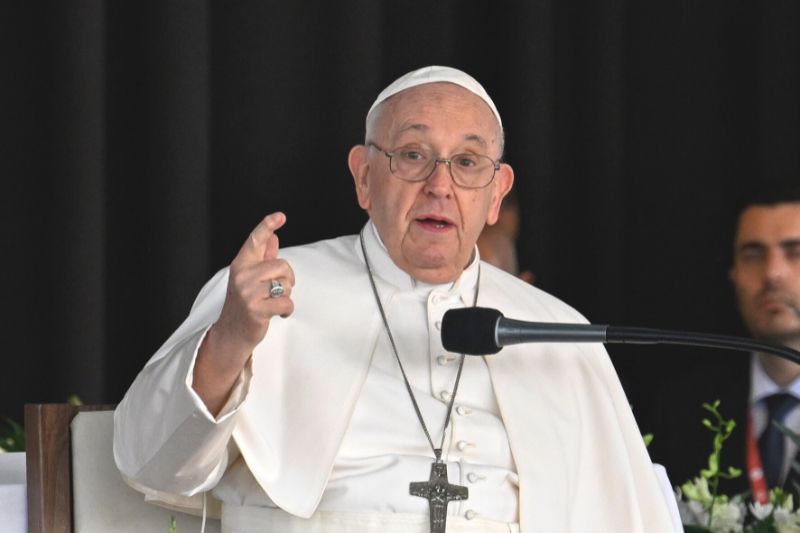The war in Ukraine following the Russian invasion is heading towards the end of its second year. Most strategists believe that it will continue for much longer. If it is to end in a Russian withdrawal Ukraine will need continuing military, economic and political support from its allies. It will also require unwavering readiness to endure hardship from the Ukrainian people. For that reason Volodymyr Zelenskyy’s efforts in assuring that support are vital.

That is the strategic background against which Pope Francis has named October as a month of prayer for peace in Ukraine. He has asked Catholics to pray for peace and reconciliation and for the conversion of heart that peace demands.
His emphasis sits at an angle to most public conversation about the war, which sees it as something to be won or lost, not to involve reconciliation. The Pope has often been criticised for his focus on peace to the neglect of insisting on the righteousness of the Ukrainian resistance to an unjust war waged against them. Many people, including Ukrainian Bishops, have criticised him for being too even-handed and for praising different aspects of Russian history and culture. They say that he should condemn Russia and support the Ukraine in its resistance.
From a political perspective this judgment is understandable. Pope Francis, however, has followed other recent Popes in reflecting on the war from a human perspective. Seen from this angle the cost of the war has been horrific. On the Ukrainian side people, military and civilians, have been killed or maimed in the war, civilians have fled their homes and lost their livelihood. Many have fled into neighbouring nations unable to build lives and communities. The extension of the war into the world economy has exacerbated inflation and affected trade, which in turn have led to hunger and poverty in developing nations.
The longer-term human effects of the focus on war, too, are anticipated in the plight of people whose houses have been burned in fires and washed away in floods throughout the world. The war and its corollaries have diverted and weakened the whole-hearted commitment necessary to address climate change and to limit the severity of its effects. Our grandchildren will pay a heavy price for our inattention.
Pope Francis has spoken straightforwardly of modern war as a sin. His description focuses on the movements of the heart that support war and must be converted to a desire for peace. This emphasis encourages us to reflect on our instinctive responses to news about the war. Are our first thoughts for the persons who died overnight or for the gain or loss of ground by Russia and Ukraine? Do we grieve for Russians killed as we do for Ukrainians? Do we think badly of Russia as a nation as well as in its leaders? These instinctual reactions often indicate whether we think primarily of winning and losing or of persons and their lives. Without conversion at this level there can be no lasting peace.
'Pope Francis has been criticised for adopting a simple-minded pacifism to the neglect of the rich and realistic tradition about a just war.'
Pope Francis has also been criticised for adopting a simple-minded pacifism to the neglect of the rich and realistic tradition about a just war. I believe this criticism is unjust. Like more recent Popes he considers the terms of this tradition as inadequate to deal with the reality of modern warfare. The criteria for justifying going to war (ius ad bellum) are simply unattainable in modern war. Though a war might be declared by legitimate authority (most contemporary wars are not so declared), have an arguably just cause (defence against unjust aggression counts as a just cause), and promise a reasonable chance of military victory, the immediate and future costs of modern war in destroying human life and living are always disproportionate to the gains sought.
More relevant are the ethical criteria for the conduct of war (ius in bello) that include consideration of who may and may not be targeted in war and what exercise of force is proportionate. These govern the treatment of soldiers who have surrendered and civilians, and the selection of military targets. These criteria are routinely disregarded in war. Pope Francis has both criticised the Russian invasion and the targeting of non-combatants.
Once a war begins it becomes what St Augustine called a necessity – a situation that reflects and is sustained by human sinfulness and which needs both to be lived with and deplored. It demands that we distance ourselves from the partisan call to glorify one nation and to demonise the other. It demands also that we simultaneously enter into the suffering and loss of all those affected by it and that we work for peace.
That difficult balance of the heart lies at the heart of Pope Francis’ month of peace for Ukraine.
Andrew Hamilton is consulting editor of Eureka Street, and writer at Jesuit Social Services.
Main image: Pope Francis delivers final remarks to pilgrims and members of the faithful at the end of his prayers in Apparitions Chapel at the Sanctuary of Fatima during the ceremony in which he presided on a Rosary prayer with patients and prayed for peace in Ukraine on August 05, 2023 in Fatima, Portugal. (Horacio Villalobos / Getty Images)